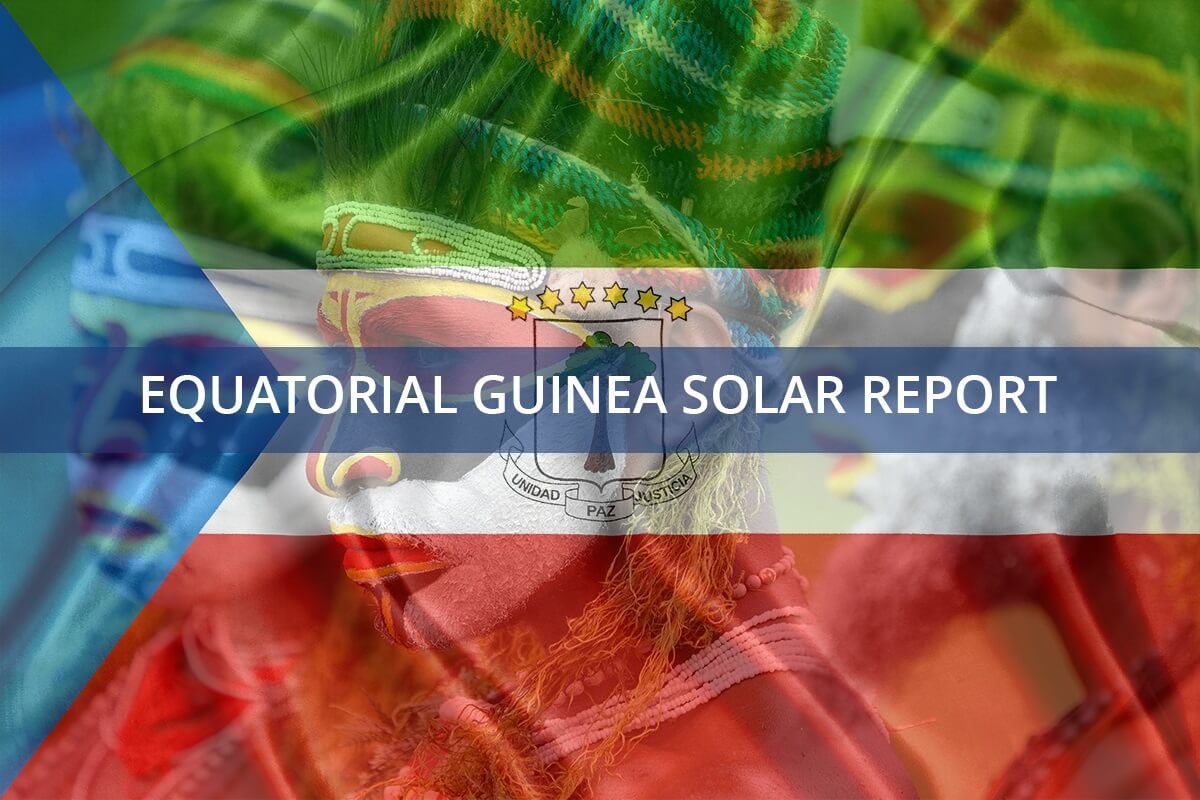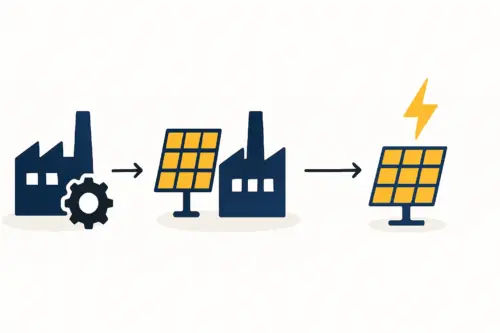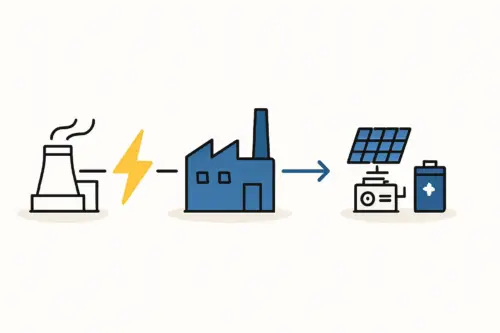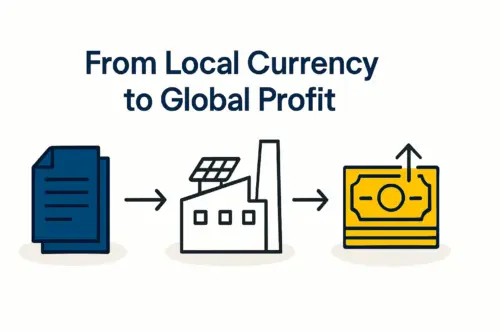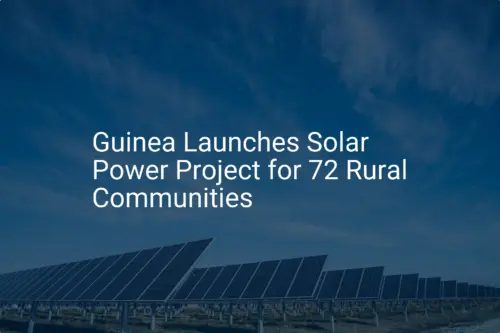An entrepreneur considering West Africa for a new solar module manufacturing facility will find a landscape of immense potential, but also one with considerable regulatory complexity. In the Republic of Guinea, however, a specific legislative framework exists to turn this potential into a reality.
The Guinean Investment Code is not merely a legal document; it is a strategic invitation designed to attract and support foreign investment, particularly in priority sectors like renewable energy.
This article breaks down the code, explaining the specific incentives available for a solar manufacturing venture. We will cover tax and customs benefits, the application process through the official investment agency, and the framework for securing factory land.
What is the Guinean Investment Code?
The cornerstone of Guinea’s investment promotion strategy is Law L/2015/008/AN, commonly known as the Investment Code. Its objective is to foster a secure, transparent, and attractive environment for both domestic and foreign investors.
To achieve this, the government established the Agency for the Promotion of Private Investment (APIP-Guinée), which acts as a central point of contact—a “One-Stop-Shop” or Guichet Unique—for investors navigating the administrative process.
The code’s effectiveness lies in its structured incentives, which are designed to significantly reduce financial barriers to entry and improve the profitability of new enterprises during their critical early years. For an entrepreneur planning to establish a solar panel factory, understanding these provisions is a crucial first step.
Key Incentive Structures for Solar Manufacturing
The Investment Code offers two primary pathways for investors to access benefits: Privileged Regimes and Sectoral Regimes. A solar manufacturing project is well-positioned to qualify under both, depending on the scale of the operation.
The Privileged Regimes (Régimes Privilégiés)
These regimes are structured based on the amount of capital invested and the number of permanent Guinean jobs created. They are categorized as follows:
- Regime A: For investments creating a specified number of jobs.
- Regime B: For larger investments exceeding a certain threshold in Guinean Francs (GNF).
- Regime C: For substantial investments in key infrastructure sectors.
While these offer broad benefits, the most direct advantages for a solar venture often come from sector-specific provisions.
The Sectoral Regime for Renewable Energy
Recognizing the strategic importance of energy independence and sustainable development, the Guinean government established a specific sectoral regime for renewable energy. This is the most relevant framework for a solar module manufacturer, as investments approved under this regime gain access to a potent set of fiscal and customs advantages tailored to the industry’s needs.
Ready to make big Profits?
The solar Industry is Booming
WE HELP NEWCOMERS to the solar industry start their own solar module production line. Customers can make BIG PROFITS by selling modules and finding investors, without wasting money and time on things they don't need!
Unpacking the Financial Advantages: Tax and Customs Exemptions
For any manufacturing business, the initial capital outlay and early-year operational costs are major hurdles. Guinea’s Investment Code directly addresses these challenges with significant exemptions.
Customs Duty Relief on Equipment
One of the most impactful incentives is the exemption from all customs duties and taxes on imported production equipment. The cost of [Internal Link: “solar panel production equipment” to /equipment/overview] represents a substantial part of the [Internal Link: “initial investment” to /investment/financial-planning].
Eliminating import tariffs for machinery like laminators, stringers, and testers makes the project significantly more financially viable from day one. This provision applies for a defined period, typically covering the entire factory setup phase.

Corporate Tax and VAT Exemptions
To support long-term sustainability, approved projects benefit from substantial tax relief during the operational phase. This includes:
-
Exemption from Corporate Income Tax (BIC): New solar manufacturing companies can receive a full exemption for five to eight years, depending on the project’s location and scale. This allows the business to reinvest its earnings into growth and stabilization.
-
Exemption from Value Added Tax (VAT): The code provides a VAT exemption on key inputs and on the solar equipment manufactured and sold within Guinea, enhancing the price competitiveness of locally produced modules.
-
Exemption from the Business Tax (TPU): Companies are also exempt from the Taxe Professionnelle Unique for an extended period, further reducing the fixed cost burden.
The Application Process: A Step-by-Step Guide
APIP-Guinée is designed to simplify the process for investors. Its One-Stop-Shop centralizes the procedures required for company formation and incentive approval.
The general process follows a clear sequence:
-
Company Registration: The first step is legally establishing a company in Guinea, a process facilitated by APIP.
-
Application Submission: The investor submits a formal application file for approval (agrément) under the Investment Code. This file must be comprehensive, including a detailed [Internal Link: “business plan for a solar factory” to /resources/business-plan-guide], financial projections, and technical specifications.
-
Inter-ministerial Review: The application is reviewed by a committee of representatives from relevant ministries (e.g., Finance, Industry, Energy) to ensure it aligns with national development goals.
-
Issuance of Approval (Agrément): Once approved, the investor receives an official certificate (agrément) that grants the project the benefits and exemptions outlined in the Investment Code.

Securing Land for Your Manufacturing Facility
The Investment Code also addresses the critical issue of land access. While Guinean law reserves land ownership for its nationals, it provides secure, long-term options for foreign investors. APIP plays a key role in helping approved projects identify and secure suitable industrial land.
The most common instrument is the long-term lease, or bail emphytéotique, which can extend for decades and provide the security of tenure necessary for a significant industrial investment. APIP often facilitates access to designated industrial zones where essential infrastructure like power and water is more readily available. However, in regions with developing infrastructure, investors must conduct thorough due diligence on site-specific conditions.

Why This Matters for Your Solar Venture
The Guinean Investment Code is more than a list of benefits; it is a clear signal of the government’s commitment to developing its renewable energy sector. For an entrepreneur, this framework transforms a high-potential market into a tangible business opportunity.
Experience from J.v.G. turnkey projects in emerging markets shows that leveraging these government incentives is a critical factor in achieving early profitability. The combination of reduced capital expenditure on equipment and multi-year tax holidays creates a much faster path to return on investment. It effectively de-risks the venture and provides a stable foundation for long-term growth.
Frequently Asked Questions (FAQ)
Is the Investment Code applicable to both local and foreign investors?
Yes, the code is designed to promote all private investment, offering the same incentives to both Guinean nationals and foreign entities to encourage joint ventures and broad economic development.
What is the most important document needed for the application?
A well-structured and comprehensive business plan is essential. It must clearly articulate the project’s scope, technical feasibility, financial projections, job creation estimates, and its contribution to the local economy.
How long does the approval process typically take?
While timelines can vary with project complexity, APIP’s One-Stop-Shop is designed to streamline the process. Preparing a thorough and accurate application file is the most effective way to ensure a smooth review.
Are these incentives guaranteed for any solar project?
No, incentives are not automatic. The project must be formally submitted to APIP and receive an official approval certificate (agrément). Approval is contingent on the project meeting the criteria in the Investment Code and aligning with Guinea’s strategic objectives.
Conclusion and Next Steps
For business professionals looking to enter the solar manufacturing industry, Guinea presents a compelling case. Its Investment Code offers a clear, structured, and financially advantageous framework that directly addresses the primary concerns of a new industrial venture. The combination of customs relief, tax holidays, and administrative support creates a welcoming environment for establishing a profitable and impactful enterprise.
Navigating these regulations and preparing a successful application requires careful planning and a deep understanding of both the legal requirements and the technical aspects of solar production. For entrepreneurs planning a [Internal Link: “turnkey solar manufacturing line” to /services/turnkey-solutions], mastering these details from the outset is essential for building a successful and lasting business.

